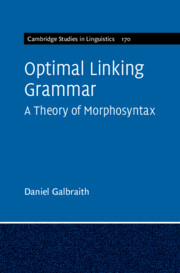2 - Case Study: Non-Nominative Subjects
Published online by Cambridge University Press: 20 April 2023
Summary
This chapter focuses on an illustrative phenomenon that has presented challenges for previous theories: non-nominative subjects. A summary of preceding literature is given, highlighting the relevant subjecthood properties of the Icelandic preverbal datives, as well as the subject-licensing syntactic positions in that language. A contrast is then drawn with similar dative arguments in German, concluding that the German obliques do not behave as subjects with respect to control properties, and do not occupy Spec,TP like the Icelandic datives. Before investigating the subjecthood of the Faroese datives, a detailed overview of what is currently known of Faroese clause structure is presented to establish the evidence for argument-licensing positions in the language. The standard subjecthood tests are applied to the Faroese dative-experiencer predicates, which demonstrate that the Faroese datives behave very similarly to those in Icelandic with respect to subjecthood properties. Given that the dative arguments in such sentences appear to be true subjects, and therefore the subject licensing position of Spec,TP seems to be the same in both Faroese and Icelandic, the differences in object case and number agreement with a plural object remain to be explained. This is explored in Chapters 3–7.
Keywords
Information
- Type
- Chapter
- Information
- Optimal Linking GrammarA Theory of Morphosyntax, pp. 33 - 61Publisher: Cambridge University PressPrint publication year: 2023
